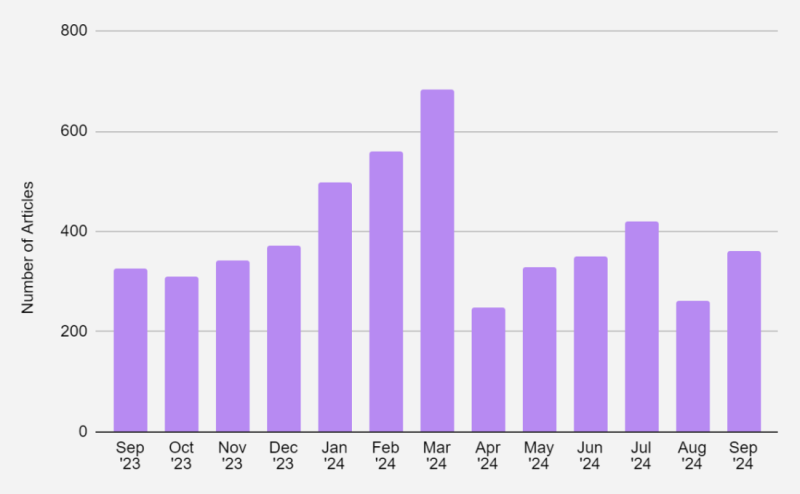Introduction
In this edition of Bridgehead Social Care's monthly news round-up we examine the adult social care sector's news coverage over the past month.
Between 1 and 30 September, references to 'adult social care' appeared in 360 unique media articles across the UK, a figure 37 per cent higher than August's coverage statistics, which stood at 262 articles.
For context, the chart below plots mentions of adult social care on a month-by-month basis over the past 12 months.

Coverage in September focused on several key recurring themes concerning the problems relating to local authorities struggling to maintain financial stability whilst coping with increasing demand for services, including adult social care. However, there was a continued increase in media attention around the issue of care visas which have been subject to new restrictions around bringing dependants into Britain. Another related area has been rising coverage of care worker shortages, exacerbated in the short-term by the crackdown on inward migration.
Building on from that, a central focus of news outlets, including Sky News, The Guardian, The Independent and BBC News, focused on the 'deafening silence' from the new Labour Government with regard to the care sector. Following the decision to abandon the cap on care costs for older people’s care as well as a fund giving training for 37,000 care workers, alarm has spread in the social care sector. Care homes and homecare providers have been operating with staff vacancies of more than 100,000 for several years whilst Skills for Care, which tracks the workforce, says that another 430,000 social care workers will be needed in the next decade to deal with the UK’s ageing population.
Sector leaders are crying out for greater leadership from the Labour Government to fix staffing problems and improve outcomes. So far, the Government appears committed to maintaining the policies implemented by the previous Conservative administration with regards to migration. It's unclear whether Labour's other social care policies, namely around a National Care Service and sector-wide wage bargaining, will help mitigate the effects of this decline in foreign care workers entering the UK. Given the emphasis placed on social care in Lord Darzi's report on the NHS, the upcoming Budget represents an opportunity to lead in this area.
Home Care Insight reported further on Lord Darzi's NHS report and its findings. Ramzi Suleiman, policy and public affairs manager at Carers Trust, provided a comprehensive response, welcoming Lord Darzi’s findings and emphasising the importance of sector-wide action: “Millions of unpaid carers ... have been left to plug ever larger gaps in our health and social care system by looking after family and friends at home."
According to The i, council leaders have warned of even greater pressure on their stretched budgets if Rachel Reeves cuts funding for social care from next year. Local government chiefs say they fear extra money given to town halls over the past two financial years under scrapped social care reform plans will be stopped from next year as part of the drive by Ms Reeves to save money.
Meanwhile, Community Care has published a new analysis of the New Labour years and the developments in social care under Prime Ministers Tony Blair and Gordon Brown. Of particular note is the new infrastructure for monitoring and supporting social care was introduced in England, largely copied in the devolved nations of Wales, Scotland and Northern Ireland.
In other news, Care Home Professional reported that implementing lifestyle monitoring technology in social care could free up to two million bed days across the sector. Lilli specifically identifies hospital discharge as a key area that can see improvement through the technology. If it were embraced and implemented by 2035, Lilli states it could free up to 94 million hours of carer time and create capacity to provide care for an additional 18,000 people.
Home Care Insight - Carers Trust calls for prioritising unpaid care workers following Lord Darzi’s NHS report
The Carers Trust has urged the inclusion of unpaid carers in NHS reform plans following Lord Darzi's critical report on the state of the NHS. Ramzi Suleiman from Carers Trust welcomed the report’s acknowledgment of carers' roles but stressed the need for substantial support for carers within NHS reforms. Suleiman highlighted that carers are essential to community care, reducing waiting times, and improving treatment, but are currently overstretched. He also criticised the lack of government focus on social care reform, pointing out that NHS and social care crises are interlinked and that meaningful NHS reform is impossible without addressing social care.
The i - Social care cash will be next to be cut by Reeves, local leaders warn
Council leaders have raised concerns about potential funding cuts for social care if Chancellor Rachel Reeves discontinues financial support from next year. Reeves previously scrapped the proposed cap on social care costs to address a £22 billion budget shortfall, and councils worry that funding, worth £1.3 billion in 2023/24 and £1.9 billion in 2024/25, may be withdrawn. The Local Government Association and council leaders like Sir Stephen Houghton have urged Reeves to confirm ongoing funding to provide financial certainty. Council leaders stress that continued investment and a sustainable plan for social care are crucial for addressing systemic pressures and ensuring better outcomes.
The Guardian - Social care chiefs sound alarm at Labour’s ‘deafening silence’ on sector
Social care leaders have criticised Labour for abandoning key social care commitments, such as the cap on care costs and a training fund for 37,000 workers, suggesting Labour is repeating past government failures to address the social care crisis. Despite Labour's initial pledge to create a National Care Service, its recent actions indicate a focus on the NHS at the expense of social care, despite the interdependence of both sectors. Leaders urge the government to prioritise social care alongside the NHS, warning of potential tragedies if the crisis remains unaddressed.
Community Care - Social work in the 2000s: New Labour’s focus on performance management
Labour, under Tony Blair, sought to modernise social work, focusing on performance monitoring and improvement through mechanisms like league tables, star ratings, and inspections, which often led to negative morale among workers. Despite stringent oversight, Labour invested in social services. Structural changes included the creation of new bodies for inspection, regulation, and workforce development, much of which still shapes social care today. Labour's approach combined increased funding and reform with an emphasis on accountability, creating ongoing debates about balancing oversight with supportive practices.
Care Home Professional - Monitoring technology in social care could free up to two million bed days
A report by health-tech company Lilli suggests that using lifestyle monitoring technology in social care could free up two million bed days and save the NHS £1.2 billion. This technology tracks behaviour and health indicators (e.g., movement, eating, bathroom use) to provide early alerts for care needs, helping to prevent hospital admissions. The report highlights benefits like earlier hospital discharges, saving enough to fund 2,000 nurse salaries over ten years, freeing up 94 million hours of carer time, and potentially saving councils £3 billion by 2035. Lilli emphasizes that investing in this technology now could address care deficits and improve outcomes as the population ages.



